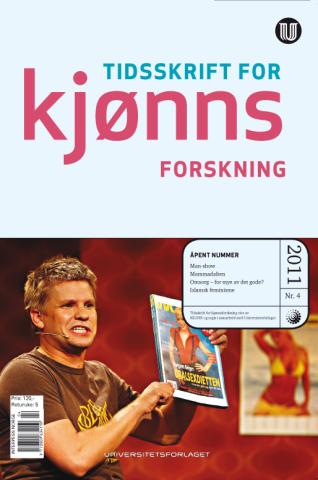Open issue

Articles
Fredrik Langeland:
The reflexive nostalgia of masculinity in TV 2 Zebra’s Manshow
This article deals with representations of masculinities in the Norwegian media and popular culture in the 2000s. Fredrik Langeland examines the ways in which the Norwegian TV program Manshow, which was aired on the commercial channel TV2 Zebra from 2006 to 2009, provides an opportunity to analyze discursive conflicts concerning masculinity in Norwegian society. Manshow was a humorous TV program with an explicit male chauvinistic profile and an emphasis on heterosexual male bonding. The program was launched at the same time as some people were claiming that Norwegian men were now being marginalized in a feminized society. Through a close reading of the opening of the show’s first episode in 2006, he highlights how Manshow creates a space where men have free access to enjoyment such as drinking beer and objectifying women. This is made possible by the use of irony, or what he characterizes as the reflexive nostalgia of masculinity.
Keywords: masculinity, popular culture, television, irony, nostalgia
Gjertrud Sæter and Øystein Gullvåg Holter:
"My husband – a mama’s boy". Gender, power and normality in the discourse of "mama’s boy"
The present paper combines post-structural cultural analysis with structural sociological analy-sis, thus intending to understand the phenomenon of «momma’s boy» (or mama’s boy) in heterosexual relationships. The "momma’s boy" as a figure is seen as problematic from a woman’s perspective, usually in combination with the figure of an intrusive mother-in-law. Based on qualitative in-depth readings of personal narratives, advice columns and Internet discussions of the momma’s boy problem, as well as men and masculinity studies and gender equality research, we discuss how gendered borders and performances citations become particularly acute and intense, and conclude that representations of the mamma’s boy express lim-ited opportunities for men, at the same time as the strong cultural images of momma’s boy become "carriers" of power discourses.
Keywords: "momma’s boy" (or mama’s boy), masculinity, stigma, discourse, power discourse, mother, mother-in-law, daughter-in-law, gender, gender equality
Ulla-Britt Lilleaas and Pia Ingrid Fivel:
Too much of a good thing? – women’s involvement in men’s health and illness
International studies show that women become both practically and emotionally involved in their partner’s health. According to our findings, these expectations regarding involvement are more an acquired and innately embodied sense of duty. There are also emotions that become transformed into rules that many women strive to follow. Moreover, these rules are difficult to defy if they consider them to be meaningful. However, our study also reveals that women who ascribe to these expectations risk becoming exhausted and may even develop health problems of their own. Therefore, while it may be comforting for men to know that their health will be well taken care of by their spouses, in this article we will discuss the finding that this form of dependency may also make these caregiving women feel that their own lives are being intruded upon and controlled. If involvement deprives men of assuming responsibility for their own health, this could unfortunately result in their behaving in ways that undermine their own health. Seen from a long-term perspective, serious consequences resulting from the above men-tioned interaction could arise, leading to a negative sense of well-being shared by both spouses.
Keywords: gender, emotional involvement, emotional capital, bodily state of preparedness, caregiver’s health, prostate cancer
Marianne Bøe and Liv Tønnesen:
New Challenges to Islamic Feminism: The Many Faces of Women’s Activism in Sudan and Iran
While women’s activism in the Muslim world has a long, rich history, Islamic feminism is a more recent form of activism, which argues for equal rights between men and women within the framework of Islam. Based on interviews with a range of women activists in Khartoum, Sudan and Teheran, Iran conducted during the last five years, the article investigates the growth of Islamic feminism in these two Islamic states. Further, the article critically discusses the challenges encountered locally by women activists at a time when Islamic feminism is being organized as a global model for Muslim women’s activism. In the article, the authors argue that Islamic feminism stands strongly in the two Islamic states of Sudan and Iran, but that there are multiple faces of women’s activism based on fundamentally competing ideological frameworks. Contemporary women’s activism in Sudan and Iran is fragmented with regards to defining women’s rights in terms of Islamic feminism, secular feminism or Islamic women’s activism. The many faces of women’s activism in Sudan and Iran that this article presents thus illustrate that there are multiple repertoires of women’s activism in the two countries today that do not necessarily correspond to the framework of emerging global Islamic feminism.
Keywords: Islamic feminism, women’s activism, Iran, Sudan, local, global